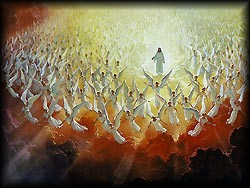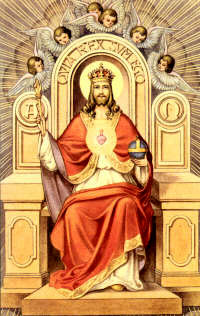Did you not know that I must be in my Father’s house?
(Lk 2:41-52)
 They went up according to festival custom.
They went up according to festival custom.The whole family--three of them--practiced their religion. It reminds me of Fr. Patrick Peyton's belief: "The family that prays together stays together."
When his parents saw him, they were astonished.The natural reaction would be relief mixed with anger. But why were they astonished? What they saw was unexpected. A twelve-year old boy was in the Temple and in the midst of the big shots. And it seemed that he was at home with them even though he was only twelve.
Did you not know that I must be in my Father’s house?With that question, Mary and Joseph knew that Jesus knew that he (Joseph) was not his father. And with that question, too, he was making a bold assertion--God was his Father.
His mother kept all these things in her heart.What she and Joseph witnessed was part of the mystery surrounding Jesus. Mary took this event too as part of her reflection to understand Jesus and what was to become of him.
And Jesus advanced in wisdom.Jesus was truly God. But he was truly human, too. He had to go through the process of intellectual growth.
With the finding of Jesus in the Temple, the infancy narrative ends. The next episode that the Gospel relates happened 18 years later with the beginning of the ministry of John the Baptist and Jesus.
STORY
Here is a cute story about what our families are called to be.
In the heart of a valley of fields, woods and meadows there lived a happy little family in a small two-storied house. There were three of them at the time: the mother and father, and a fair-haired six year old little boy. The father worked in a factory making water-taps, the mother cultivated the orchard behind the house and kept a stern eye on twelve fussy hens and a domineering rooster. The child was happy to be able to go to school, and proud that he could already write his name. He also new what "exuberant" meant.
Through the centre of the valley a bubbling stream wound its way.
The house was in a rather isolated spot and so on Sundays the small family would squeeze itself into a tiny car and go to Mass in the parish church. Afterwards they consumed ice cream or drank hot chocolate, according to the season.
In the evening the little house was always in a mild state of turmoil, because when it was the child's bedtime there was always something he wanted to do, like counting the stars or the glowworms, or how many little squares there were on the tablecloth.
Before going to sleep they all prayed together, and every night an angel of the Lord collected their prayers and took them to heaven.
One autumn it rained for days on end and the stream became swollen with dirty water Higher up, mud and tree-trunks combined to form a dam, which led in turn to the formation of a muddy lake. As darkness fell, the dam gave way under the pressure of the water, and the valley began to be flooded.
The father awoke mother and child. They clung to each other in terror because the water had already invaded the ground floor of the little house and was steadily rising and getting darker
"Up to the roof!", cried Father He took the boy, clinging silently about his neck with eyes full of fear, and climbed up into the attic and then on to the roof Mother followed them.
On the roof they felt as through they were shipwrecked on an island which was growing steadily smaller, because the water continued to rise relentlessly and soon reached the father's knees.
Father got his feet firmly fixed on the roof, embraced the mother and said: "Take the child in your arms and get up onto my shoulders"!
Mother and child climbed up onto the father's shoulders, as he said: "Put your feet on my shoulders and the boy's on your own. Don't be afraid. Whatever happens I will not leave you!"
The mother kissed the child and said: "Climb up onto my shoulders and don't be afraid. Whatever happens I will not leave you!"
The water went on rising. It covered the father, with his arms stretched out holding the mother, and then swallowed up the mother with her arms stretched out holding the child. But the father did not loosen his grip and neither did the mother, but the water went on rising. It reached the child's mouth, his eyes, his forehead.
The angel of the Lord, who had come to collect their evening prayers, saw only a mop of fair hair on the surface of the dark water
He swiftly grasped the mop of hair and pulled. Behind the hair came up the child, and attached to the child came up the mother, and holding on to the mother came up the father Neither had lost their grip.
The angel flew off and gently deposited the singular chain on a higher hill, where the water would never reach. Father, mother and child tumbled onto the grass and then hugged each other amid tears and laughter.
Instead of their prayers that evening, the angel took back to heaven their love. And all the choirs of heaven broke out into thunderous applause.



















